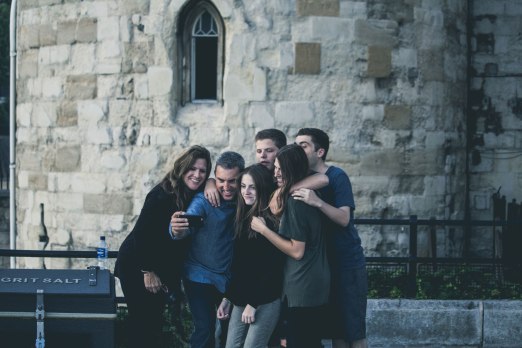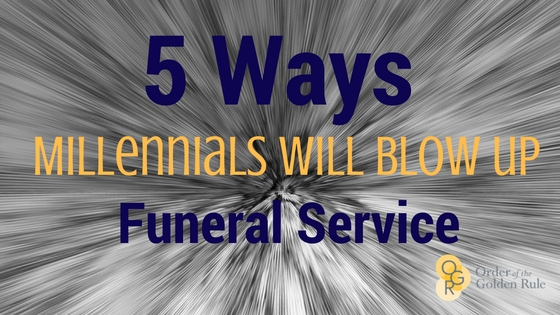5 Ways Millennials Will Blow Up Funeral Service
Guest article provided by: OGR – Order of the Golden Rule
I recently wrote about how baby boomers (ages 52-70 in 2016) are changing funeral service by demanding more personalization and value. According to a study of 3,500 baby boomers conducted by McKee Wallwork + Co., 48 percent of study participants said they were dissatisfied with funeral service as a whole and 63 percent reported being dissatisfied with their interaction with the funeral home. Where I went to school, those scores were failing grades!
Here’s an even scarier thought. Whereas baby boomers want to dress up the traditional funeral, millennials (ages 18-34 in 2016) want to blow it up and start over. To some it may seem too early to start worrying about what millennials want from funeral service. After all, the older members of this segment are in their mid-thirties.
Consider this: millennials are going to change everything. Goldman Sachs wrote, “One of the largest generations in history is about to move into its prime spending years. Millennials are poised to reshape the economy; their unique experiences will change the ways we buy and sell, forcing companies to examine how they do business for decades to come.” Uh oh. That includes funeral service!
How Millennials Will Change Memorialization

- Millennials will influence their parents’ decisions.
Millennials stay closer to their parents than previous generations. A study conducted by Influence Central found that 90 percent of millennials talk to their parents once a week or more, and 50 percent talk to their parents every day. Seventy-four percent reported feeling obligated to help their parents make informed product purchases.
Keep in mind: Focus on the perceptions your marketing messages are creating among younger people. Do your messages suggest your funeral home is limited to providing traditional funeral services or do they communicate your staff can create unique and meaningful memorial experiences that incorporate non-traditional ceremonies and venues?

- Millennials will use different funeral terminology.
Using traditional funeral terminology will reinforce perceptions that your funeral home is just like every other funeral home. Transition your vocabulary to more descriptive terms.
Keep in mind: Use less traditional terms to indicate that your funeral home offers new ideas for celebrating a loved one’s life. “Celebration of life” may have more appeal than “funeral service” and “gathering of family and friends” is more contemporary than “wake.”

- Millennials want to access information—including prices–online.
Imagine telling a millennial that music lovers used to drive miles from their homes hoping that a record store stocked a particular “album.” If it did, they were required to purchase that album before listening to it—without the option of returning it for a refund. They’d think you were crazy. They have access to just about everything online. According to FAMIC’s 2015 Study of American Attitudes Toward Ritualization and Memorialization, more than twice as many consumers between 20 and 39 years of age desire to make funeral arrangements online and buy funeral-related products on the Internet than those over 40 years of age. Retailers once thought big-ticket items were safe from online sellers, yet an Autoblog.com report determined that one-third of Americans are interested in purchasing their next vehicle online.
Keep in mind: The more information you make available online that points millennials (and their parents) to your funeral home, the better. If you don’t make information easy to find, many millennials will reject you as a potential resource for memorialization.

- Millennials will be less willing to pay for merchandise and more willing to pay for unique experiences.
A Harris Poll concluded that millennials have much less interest in buying “things” and more interest in spending money on personal experiences. It’s unlikely that millennials will embrace spending $10,000 on funeral services and merchandise unless it provides a one-of-a-kind experience to honor a loved one in a memorable way.
Keep in mind: The Harris Poll also concluded that nearly 7 out of 10 millennials believe attending events makes themfeel more connected to other people. Position your funeral home as being able to create an “event” that bonds families and friends together as they pay tribute to loved ones.

- Millennials will not want to be in your funeral home.
That’s nothing personal. They don’t want to be in any funeral home…unless it helps create a great experience. Consider including services that are personalized to the deceased that create a unique experience for those attending the funeral or memorial service: a memory jar, a customized wreath made up of photographs, an ice cream truck at the cemetery, a decorated casket, unique mementos for guests to take home, etc.
Keep in mind: While it’s important to put as much into the appearance of your funeral home as you’re able, devote just as much attention to how you can configure the space to accommodate families in unique ways. Rent props from a local theater group or party supply company to create a movie-themed funeral. Convert a storage room into a space for family retreats or a coffee lounge.
The United States Census Bureau recently announced that millennials (75.4 million) have surpassed baby boomers (74.9 million), ages 51-65, as the largest generation in the country. When they start making funeral decisions, they’re going to make them in big numbers. We need to start now to understand their attitudes and behaviors so we can accommodate their needs. Be assured that other providers will be all too happy to do so if traditional funeral homes can’t or won’t.



